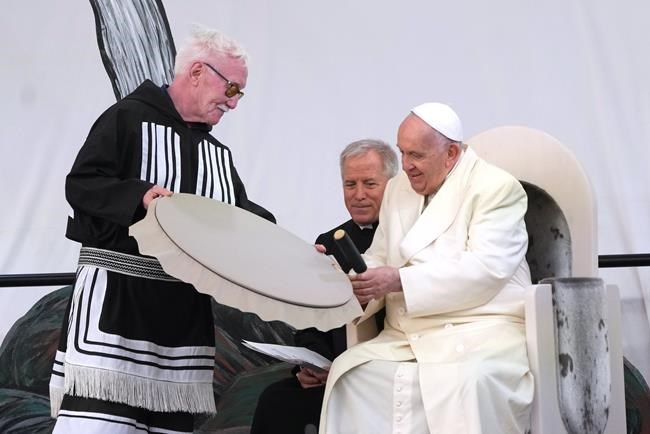IQALUIT, Nunavut — Pope Francis begged for forgiveness for the evil perpetrated by “not a few” Catholics as he wrapped up Friday a six-day visit that saw celebration and criticism for his repeated apologizes for the Roman Catholic Church’s role in cultural assimilation and residential schools.
"Mamianaq," he said as cheers rumbled through the crowd of a few hundred people in Iqaluit.
The word means "sorry" in Inuktitut,one of several Indigenous languages barred from use in residential schools, which 150,000 Indigenous children were forced to attend in Canada. Neglect and physical and sexual abuse were rampant in the schools, and the Catholic Church ran 60 per cent of them.
“How evil it is to break the bonds uniting parents and children, to damage our closest relationships, to harm and scandalize the little ones," Francis said in his final public address of the trip, translated from Spanish to Inuktitut and English.
"In this place, I want to tell you how very sorry I am and to ask forgiveness for the evil perpetrated by not a few Catholics who contributed to the policies of cultural assimilation and enfranchisement in those schools."
The apology mirrored others the pontiff gave at stops in Alberta and Quebec, during which he also spoke words in Cree, Blackfoot and Nakota.
Francis has described the historic journey as "penitential." Many applauded both his presence and apologies, but others found his words and efforts lacking.
Arnrak Korgak, a day school survivor, said he had hoped Francis would go further in his apology and acknowledge the church, as an institution, played a role. But he said there was still healing in the Pope’s words.
“It’s hard for people, especially for the survivors who experience pain and abuse,” he said. “And that had to be recognized, so that it never happens again.”
The brief stop in Nunavut's capital marked the first time a pope has travelled to the territory. Francis met privately with Inuit residential school survivors and their families before taking part in a public cultural event.
Traditional dancers, drummers and throat singers performed in front of Francis. They explained how the practices were banned in residential schools.
Mary-Lee Aliyak said the schools attempted to take away Inuit culture and language. So it was important to showcase song and dance for the pontiff.
“Today is history,” she said. “It’s making a history that we are acknowledged as people, as the First Peoples of Canada.”
One person held up a sign calling for the Doctrine of Discovery, a decree from the Vatican that was used to justify colonization, to be rescinded. It was a message seen at nearly every stop on the Pope’s tour.
Piita Irniq also performed a traditional drum dance and presented the instrument to Francis as a gift at the end. The Inuit elder has tried for decades to have Johannes Rivoire, an Oblate priest accused of sexual abuse against Inuit children, returned to Canada to face charges. An Inuit delegation to Rome earlier this year also requested the Pope personally intervene in the case.
The federal government said this week that Canada has asked France to extradite Rivoire, who is wanted on a Canada-wide warrant.
On Thursday, while at a prayer service in Quebec City, Francis acknowledged the sexual abuse of "minors and vulnerable people" for the first time on the trip
He also had a private meeting with Indigenous leaders and survivors in Quebec City earlier Friday. Ghislain Picard, head of the Assembly of First Nations Quebec-Labrador, said it will be up to each person to decide if the Pope’s trip met their expectations.
“It’s really up to them to take the measure of all this, whether it’s going to provide that kind of way for their healing," Picard said. "It’s going to take time.”
The delegation included survivors and representatives of First Nations across Eastern Canada, some of whom could be seen presenting the Pope with gifts.
Cree Grand Chief Mandy Gull-Masty said the meeting was marked by some confusion as supporters of some residential school survivors were asked to leave the room by the archbishop's staff even after papal security had let them in.
Chief Duke Peltier of the Wiikwemkoong First Nation in northern Ontario said after the meeting that he had expected "a little more sincerity and more of an acceptance of responsibility for the church’s participation in the assimilative efforts of our people."
The Canadian Conference of Catholic Bishops, who helped organize the tour, called it a significant milestone on the path of healing and reconciliation.
In a statement, it said the Pope has called on the bishops to continue to help survivors and families in healing from the traumas they have suffered.
The bishops said they heard from Indigenous people that there must be more transparency around residential school records, financial support and a look at the Doctrine of Discovery.
Prior to boarding a plane back to the Vatican, Francis sat with Gov. Gen. Mary Simon and shook hands with survivors and delegates.
In his earlier address in Quebec City, Francis said he had been enriched by stories of the Indigenous people he has met in Canada.
"I can truly say that, while I came to be with you, it was your life and experiences, the Indigenous realities of these lands, that have touched me, remained with me, and will always be a part of me."
The Indian Residential Schools Resolution Health Support Program has a hotline to help residential school survivors and their relatives suffering trauma invoked by the recall of past abuse. The number is 1-866-925-4419.
This report by The Canadian Press was first published July 29, 2022.
— With files from Sidhartha Banerjee in Quebec City and Kelly Geraldine Malone in Winnipeg
Brittany Hobson, The Canadian Press



